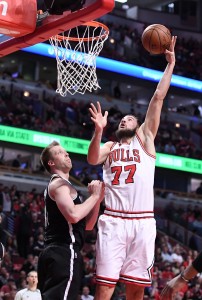Jeremy Lin boldly stated that his Nets will make the playoffs this upcoming season while answering questions from fans in an Instagram Live video, relays A.J. Neuharth-Keusch of USA Today Sports.
“We’re making the playoffs. I don’t care what anybody else says to me,” said Lin. He went on to say, “We’re gonna do some serious damage next year… I’m pretty sure he’ll (D’Angelo Russell) start (at shooting guard), but it will be pretty interchangeable. And then when one of us is out of the game, the other person most likely will have the ball in their hands. It will probably be a little bit combo guard-esque.”
This offseason the Nets have added Russell, as well as DeMarre Carroll and Timofey Mozgov. Brooklyn will be coming off a season in which it finished 20-62, dead last in the NBA standings. Lin played in just 36 games due to injury, but averaged a furtive 14.5 PPG to go with 5.1 APG and 3.8 RPG. Furthermore, Lin managed to put up those strong numbers in a mere 24.5 minutes per contest.
- Raptors president Masai Ujiri addressed rumors that the team is trying to unload center Jonas Valanciunas, via Josh Lewenberg of The Sports Network. Ujiri said that he believes in Valanciunas’ talent and values his offensive rebounding. While admitting that the team looked at trading Valanciunas when they were in the tax, the team is now “very comfortable” keeping JV.
- Raptors guard Malcolm Miller underwent right ankle surgery, the team announced via press release (link via Twitter). Miller is expected to miss the next 12 weeks. He signed the team’s first two-way contract on July 9.
- Also via Josh Lewenberg of The Sports Network, the Raptors president says the team will “add a couple of different players. Maybe they’re non-guarantees, I don’t know.”
- The Celtics employed a creative use of the stretch provision on the contract of Demetrius Jackson, reports Bobby Marks of ESPN. A day prior to waiving the former Notre Dame guard, Boston exercised the 2019/20 non-guaranteed team option on Jackson. This allowed Boston to stretch the contract over seven years rather than five, lowering the cap hit per year to $92,857 instead of $130,000.


